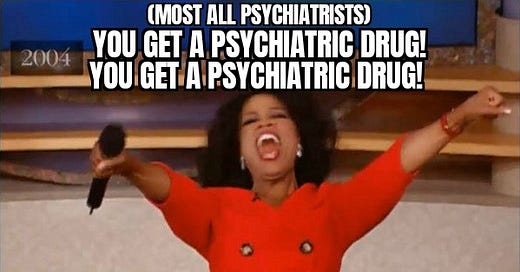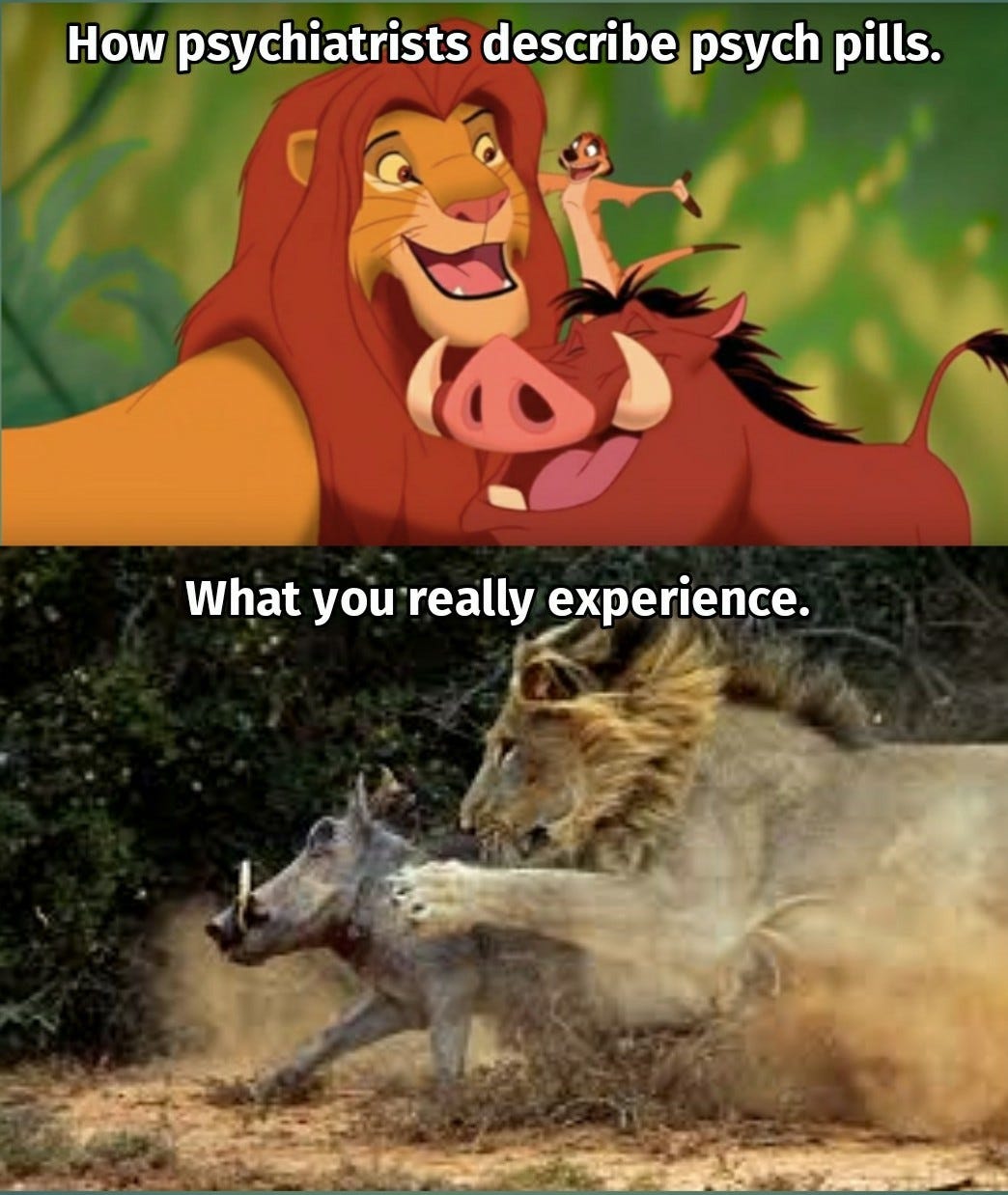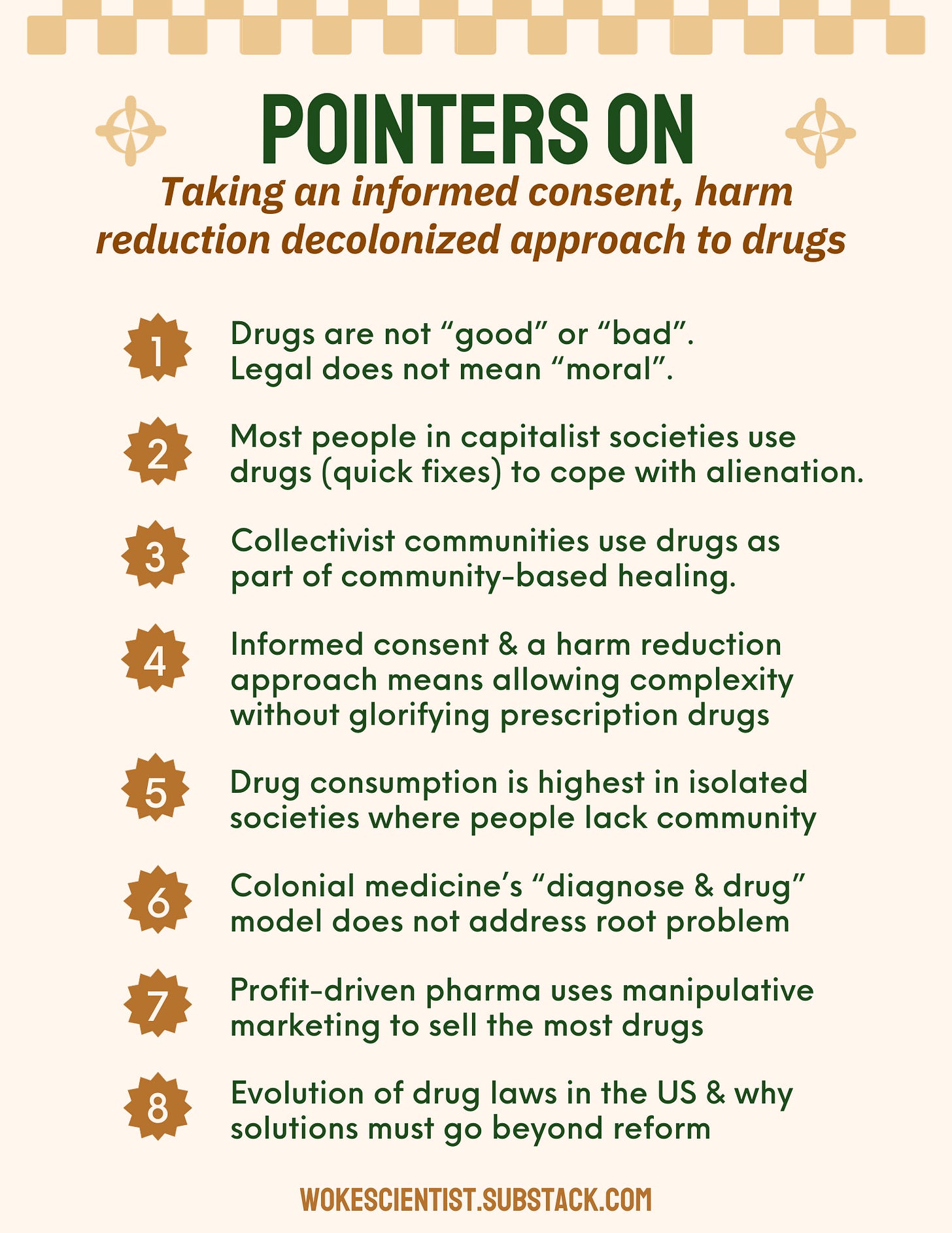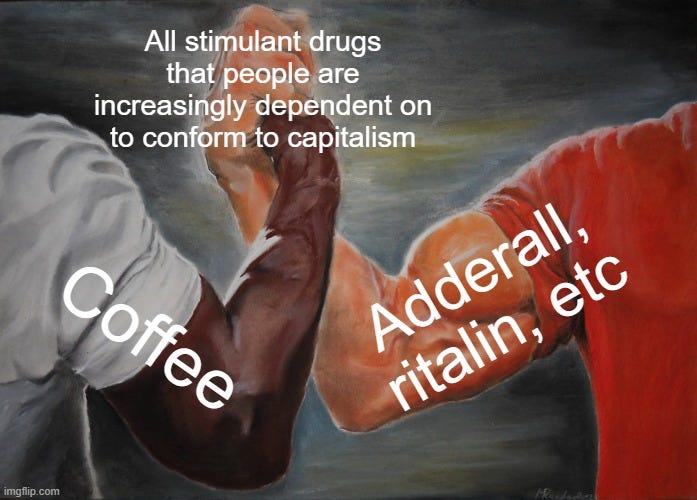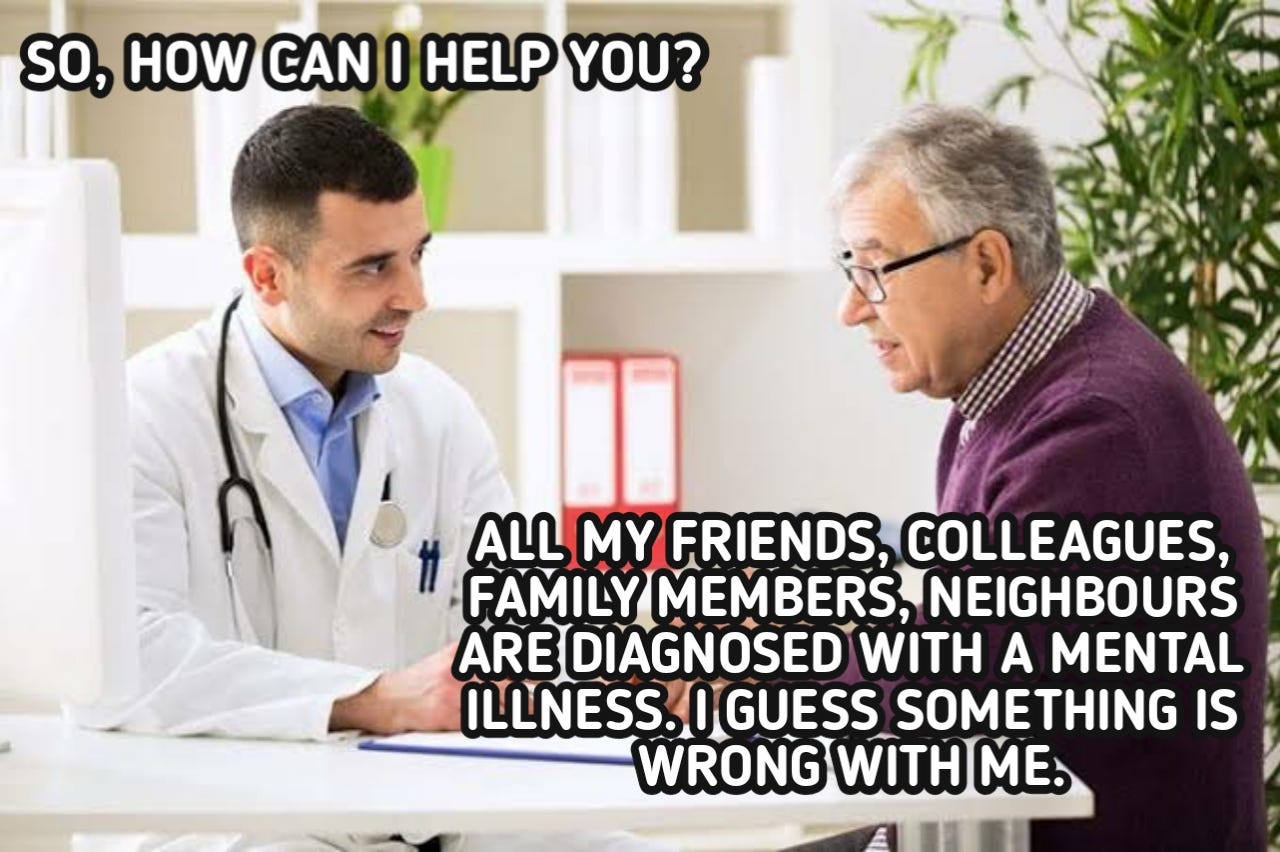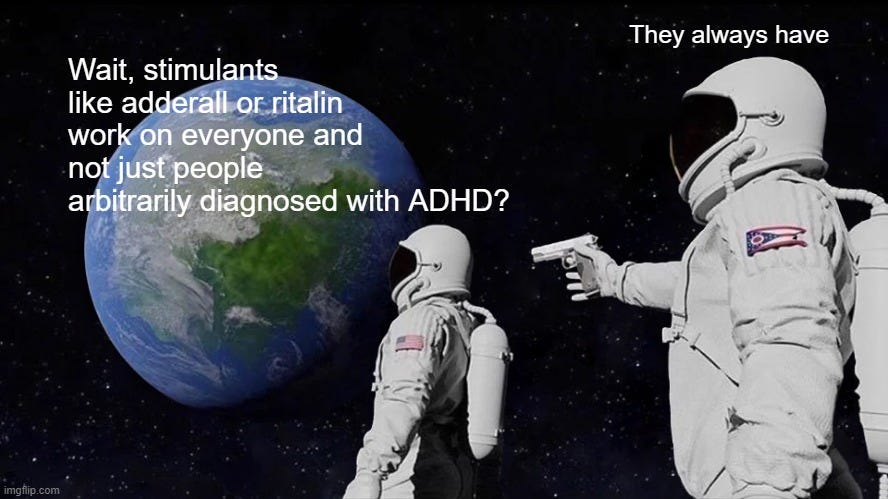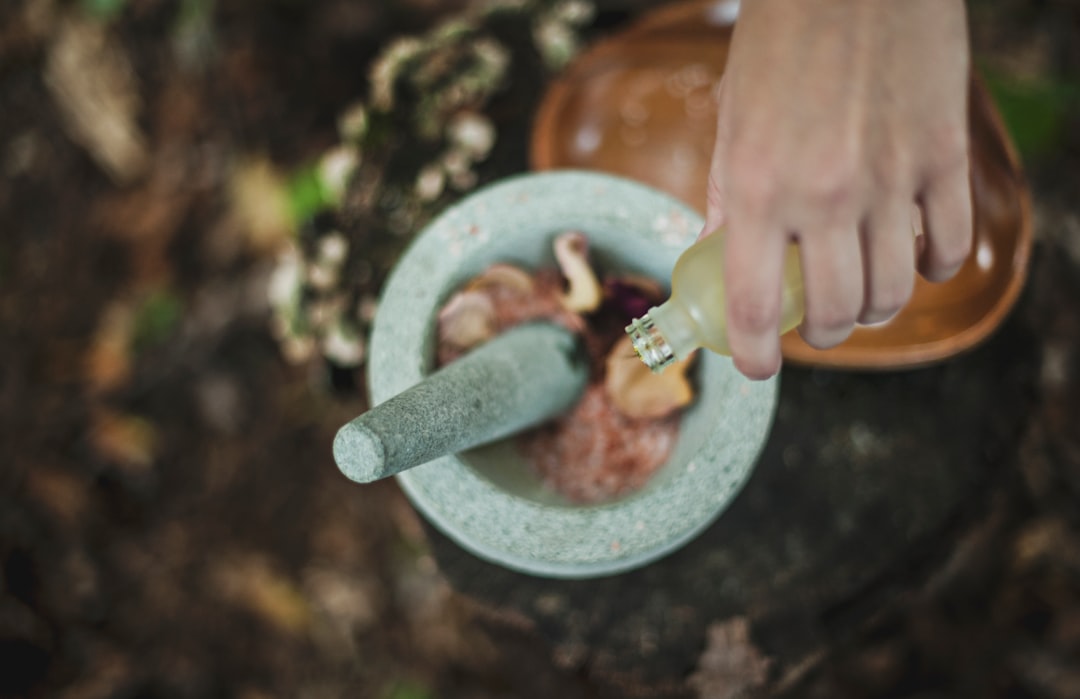There is no medication/ drug/ quick fix that can heal us in isolation. We need community.
Moving beyond the "drugs are good/ bad" binary to a more collectivist, complex approach to healing
I was diagnosed with my first series of psychiatric illnesses a couple years after moving to the United States for college. At 17, I was alone in a foreign land, stripped of connection to community, culture, ancestral roots or my mother-land and socialized with a desperation to prove myself. I had fallen for the lie that this colonial empire had my best interests in mind & internalized its values as my own. I wanted to succeed under capitalism, hoping that it would be give me some future safety & stability. Yet, I was unable to keep up with the individualistic, competitive, cut-throat, fast-paced hustle & grind culture of higher education and kept “falling behind”. I was exhausted, demotivated, sad, lonely and isolated in many ways. Seeking validation from these colonial academic systems that were glamorized as the “best in the world” made me feel deeply inadequate & worthless. And so I turned to the only “solution” that was shoved in my face by society over & over again… therapy and psychiatry.
I accumulated a long list of psychiatric diagnoses that reduced my distress to biological disorders & neurological deficits. Many of my more “physical” ailments felt into vague buckets of “chronic pain” or “unknown immune dysfunction”, framed as medical mysteries with no clear pre-existing diagnostic label that would easily explain all my symptoms. I was prescribed a constantly shifting cocktail of psychotropic drugs, from stimulants & anti-depressants to anti-psychotics & mood stabilizers, or prescription pain medications. At the time- I really thought this was what I needed and that medicine had truly “saved me” because it allowed me to perform a tad bit better at work… but at what cost?
My grandma, my ammi, also lived in Los Angeles and I visited her every weekend. When she learned of my diagnoses, she was increasingly wary of how beneficial they would be in addressing the roots of my problems considering they framed me as THE problem that needed to be fixed. When she saw my overcrowded pill box, she warned me of the dangers of relying on these medications to give me a genuine sense of fulfillment & contentment that only came from grounding in community & culture. She wanted me to step away from chasing trophies or academic accolades & work on inching away from seeking the approval of institutions. “You need people, our food, our traditions, our language, Allah, you need friends… you need more than these pills can possibly give you" I responded with rage. “There is nothing “wrong” with you. We can care for you just as you are. You are not the problem but they will destroy you and make you feel as though it was your fault.” I furiously dismissed her concern and accused her of invalidating my suffering. I insulted our culture in front of her, calling it “backwards” & uplifted western, capitalist society as the pinnacle of freedom, at the forefront of cutting-edge, humanitarian, medical innovation that would “fix” me. I didn’t know any better. I was regurgitating the colonial values I was socialized with my whole life.
Fast forward to today, over a decade later, my life is dedicated to building community care, practicing taking a more decolonized/ collectivist/ ecological/ political approach to medicine while collaboratively working to dismantle colonial, capitalist healthcare systems that profit off of our sickness. Today, when I critique the “diagnose & drug” model of medicine, especially psychiatry, often I’m met with a familiar outpour of rage & contempt— a similar type of anger that I once directed at my own grandma. Ironic, isn’t it? A full circle.
Why do some people get so angry and infuriated when confronted with information that suggests that their suffering and distress are a result of exploitative capitalist/ colonial systems rather than stemming from innate, individual biological defects?
Many people actively resist taking a more sociopolitical approach to understand their pain in a way that contextualizes it as part of many ailments that are plaguing our society at large. Some people think criticism of drug corporations and capitalist healthcare is somehow a denial of their suffering or minimizing the reality & severity of their problems. But that is simply not true. If people around the world are seeing an exponential rise in health issues including those framed as mental illness AND there is a parallel exponential increase in ecological crises ravaging the planet, clearly there is a common denominator driving these very REAL issues. We are sick. The Earth is sick. Understanding & addressing the sociopolitical conditions that lead to the emergence of such widespread suffering does not imply that this suffering does not exist or that it doesn’t take a serious toll on our daily lives. It further validates our individual experiences, helps us feel less alone in our struggles and tells us that the problem extends far beyond our individual biology which means real solutions have to be collective. If it isn’t just me or you… if there is something deeper that is hurting us all in different ways, then can we not find hope in our solidarity?
In today’s piece, I want to share what I actually think about drugs/ medications with the complexity that this topic deserves. In the next newsletter, I’ll dive into my personal experiences with drugs— including my “lived experience” from working within academic medicine on both patient care & research while also being a patient who was harmed on the other side of the power dynamic.
Drugs are not “good” or “bad”. Some drugs like prescription medications aren’t inherently more moral than others just because they are legal.
When I use the word “drugs”- it is an umbrella term that refers to any substance that can alter our physiology and mental state when consumed. At baseline, “drug” is a neutral term but depending on which drug we talk about, there may be socially constructed negative connotations. Often, prescription drugs like Adderall or Ritalin, antidepressants like Prozac or Zoloft and anxiolytics like Lexapro or even pain killers like Morphine are framed as “life-savers” that improve an individual’s health while drugs that are criminalized by the state like crack cocaine or heroine are considered immoral or unnecessary drugs that are used by people who deserve to be relegated to the fringes of society. On the other hand, substances like coffee or tea which have caffeine (classified as a stimulant similar to methylphenidate or methamphetamine) are socially acceptable, widely consumed, habit forming drugs that many are dependent on without the associated stigma. Ironically, many drugs that are illegal are structurally similar derivatives of legal counterparts.
In general, what is legal is not an indicator for what is moral. Laws are created by the rich & the state to benefit them and advance their political & financial interests through our exploitation. Across history, drug laws have always been created by the state to target, police, incarcerate & terrorize marginalized communities, not to ensure public safety. In a section below for paid subscribers, I dive into the historical progression & evolution of drug laws in the United States, from opium & cocaine to marijuana, showing that a drug’s ‘legal’ or ‘illegal’ designation has nothing to do with morality or their downstream health effects.
Most people in capitalist societies use drugs (of any kind) or other quick fixes to cope with the daily alienation and suffering that comes from existing under systems that force us to earn the right to live.
The context of drug use in individualistic capitalist societies like the United States is defined by isolation & alienation along with a desire to conform to dominant societal expectations, particularly when it comes to maximizing productivity & succeeding at work. This is also the context of a lot of modern drug use in the Global South in industrialized, urban communities that are experiencing intergenerational trauma from colonialism and capitalism that have left them fragmented from their community and culture as they desperately try to access basic survival resources. People are overworked, exploited, exhausted and commodified for profit. This is why we use drugs— to try to meet the brutal demands of a capitalist society as it berates & taunts us for not being worthy enough to have the right to live even though none of us chose to be born.
People turn to psychoactive drugs to be more productive at work, operate at a faster pace to keep up with the pressure of meeting deadlines, feel more motivated to focus on monotonous/ mundane/ boring tasks for long periods of time, numb any intense/ deep emotions that inevitably become barriers to one’s ability to be the ideal high-achieving worker or unwind and distract oneself after work only to get back on the hamster wheel the next day. In general, drug use is socially acceptable, encouraged and even applauded if it enables better conformity and assimilation into capitalism. If a drug helps you perform & be increasingly productive at work in a manner that garners validation from authority figures or institutions, then it is considered a “good drug”— stimulants like caffeine or amphetamines are prime examples of such drugs.
Meanwhile, drugs like alcohol, cigarettes, opiates, marijuana, prescription sleep aids, or depressants like benzodiazepines are drugs we turn to when we want to turn everything off for a moment to find some brief relief from the daily misery of work. As long as someone is successful under capitalism, their drug use is deemed appropriate or even necessary for their wellbeing. However, the moment someone’s drug use renders them unemployable or hinders their productivity, making them less exploitable, then it is framed as “drug abuse” that must be ceased. Hence, drugs that more likely to impede worker function (like heroine, crack cocaine, crystal meth) are considered problematic and unpalatable.
Bottomline— all of these drugs are being used by people for similar reasons and the same system is driving the detrimental, destructive use of any of these drugs on an individual and collective scale. We take drugs to feel better, even if for a fleeting moment. We take drugs to escape from our harsh reality, because existing in it by being fully present is far too painful. We take drugs because the way we feel when we are on them- whether it is an over-the-counter medication like Tylenol or Ibuprofen or a drug we’ve been prescribed or an “illegal” drug. Due to capitalism and the state, some drugs are designated as “dangerous street drugs” while others are uplifted as “lifesaving medications”. It is a made-up distinction. Also— it’s not just drugs that people turn to for quick fixes. Anything can be addictive. Any behavior can be habit forming. For example: many people are addicted to spending an excessive amount of time “doom-scrolling” on social media or swiping thru apps on their phone which is also a dissociative tool that can breed isolation and/or help people take a break from being grounded in their otherwise painful reality.
Collectivist communities have used drugs as part of community-based traditional medicine for thousands of years
Even though we are focusing on modern-day drug use, drugs like medicinal plants and psilocybin mushrooms or extracts derived from various ecological sources have been used as healing tools across history. The context, however, is very different than how drugs are consumed in capitalist societies, particularly in the so-called west. In collectivist communities, drugs are a part of complex, communal, ritualistic, traditional practices— they are not merely consumed in isolation and looked to as sole saviors that will cure people of ailments without communal support or in the absence of a multiplicity of other approaches. People utilize these drugs while living in close-knit communities, enmeshed in a web of intricate, intimate relationships with each other and the land that support them. Drugs are one part of culture in the same way that cooking techniques and gastronomic food traditions have been passed down generations allowing people to steward their lands and exist maintaining an intricate balance with their ecosystem— a process and social context that in itself is healing.
Culture and community are medicine. Communities hone in, practice, cultivate, honor and utilize a plethora of cultural tools developed over the years with love and care, including drugs, such that they may help people move through & navigate distress. For example, Ayahuasca in indigenous Amazonian communities, psychedelic mushrooms in many land-based communities in the Global South, traditional herbalism in South Asia like Cannabis/ Ayurveda/ Siddha/ Unani, Kava in the Pacific Islands, Kratom in South East Asia, Peyote in indigenous North and Central American communities, etc. Many of these traditional medicines are being increasingly co-opted by the wellness industry that is hellbent on turning ancestral, community-rooted medicines into atomized, depoliticized, lifeless products sold for profit to lonely consumers, devoid of the collectivist context these substances or techniques have been historically used within.
Taking an informed consent and harm reduction approach to drugs means creating room for complexity without glorifying prescription drugs over others.
In a society where we have been deprived of guaranteed access to survival resources, we’ve normalized an absurd level of baseline stress. We are made desperate by systems that exploit us & bleed us dry. Given the impossible demands that workers are expected to meet in a capitalist society and the absurd amount of misinformation from drug manufacturers that we are inundated with- we are most often unable to make a truly informed choice about how we want to engage with the medical system including how we want to engage with drugs. Medications are being pushed onto us while we’re convinced we need fixing and deprived of community-based alternatives. Drug manufacturers purposefully fund clinical trials with favorable outcomes focusing on the so-called benefits of drugs while going to great lengths to distract people from their adverse effects including shutting down bad publicity and silencing critics.
For example, stimulants help people hyper-focus and fixate on monotonous, otherwise uninteresting tasks for extended periods of time and this neutral effect is only considered a “benefit” under capitalism which expects workers to push their bodies and minds to absurd lengths. Stimulants are also widely known to cause emotional numbness, cardiovascular issues, elevated blood pressure, insomnia, compromised gastrointestinal functions, peripheral neuropathy, etc but these are minimized or dismissed as acceptable “side effects” (despite them just being affects that are experienced by users) which are often managed by adding on even more psychoactive adjunct drugs.
I believe in taking a harm reduction approach to all drugs including prescription medications. As with illicit drug use, harm reduction includes creating safe pathways for people to access drugs but it also requires so much more. People need sufficient information about how said prescription drugs impact their physical and mental health in the short and long term. This is far from how psychiatry current operates.
Keep reading with a 7-day free trial
Subscribe to Cosmic Anarchy to keep reading this post and get 7 days of free access to the full post archives.

